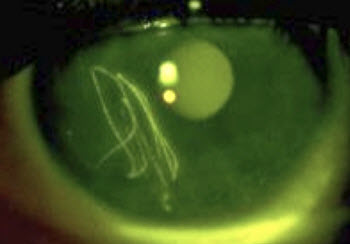Corneal abrasion
What is a corneal abrasion?
 A corneal abrasion involves the loss of the cornea’s surface epithelial. (The cornea is the transparent dome that covers the iris, the pupil and the anterior chamber of the eye.)
A corneal abrasion involves the loss of the cornea’s surface epithelial. (The cornea is the transparent dome that covers the iris, the pupil and the anterior chamber of the eye.)
The cornea’s surface epithelial can usually regrow quickly without any medical aid. However, while the epithelial is injured, there will be an increased risk for certain other eye problems, including infections.
If you are constantly causing new abrasions, e.g. by improper use of CL:s, the epithelial cells will not be able to regrow quickly enough and more serious eye problems may ensue.
How can I prevent corneal abrasions?
A corneal abrasion is usually the result of eye trauma, but it doesn’t have to be something violent like getting debris into the eyes during a car crash. Eyes are sensitive and even small things, such as accidentally scratching yourself with your nails when putting in your CL:s, can cause corneal abrasions.
Using CL:s that aren’t a good fit for your eyes can cause corneal abrasions even if you just use them for a few hours. So even if you just want some special-effects CL:s to complement your Halloween costume, getting a CL prescription is a good idea. There is no such thing as “one size fits all” when it comes to contact lenses – not even soft, cosmetic ones intended for short-time wear.
Another risk factor is leaving a contact lens in the eye for too long and/or removing a contact lens from a very dry eye. Never exceed the manufacturer’s recommendation for how long the CL should be in the eye. If your eyes feels dry, use moisturizing eye drops before removing the CL.
Recurrent corneal erosion
What is recurrent corneal erosion?
This is when the cornea’s surface epithelial fails to attach properly to the underlying membrane. The sensitive corneal nerves are now left exposed. Symptoms of corneal erosion include medium to strong eye pain, extreme sensitivity to light, and permanent or temporary decrease of eyesight.
How can I prevent corneal erosion?
Avoid corneal abrasions and corneal ulcers. It is unusual to develop corneal erosion without first having corneal abrasions and/or corneal ulcers. Certain corneal diseases can also lead to corneal erosion, especially if left untreated.
This article was last updated on: April 24, 2016

